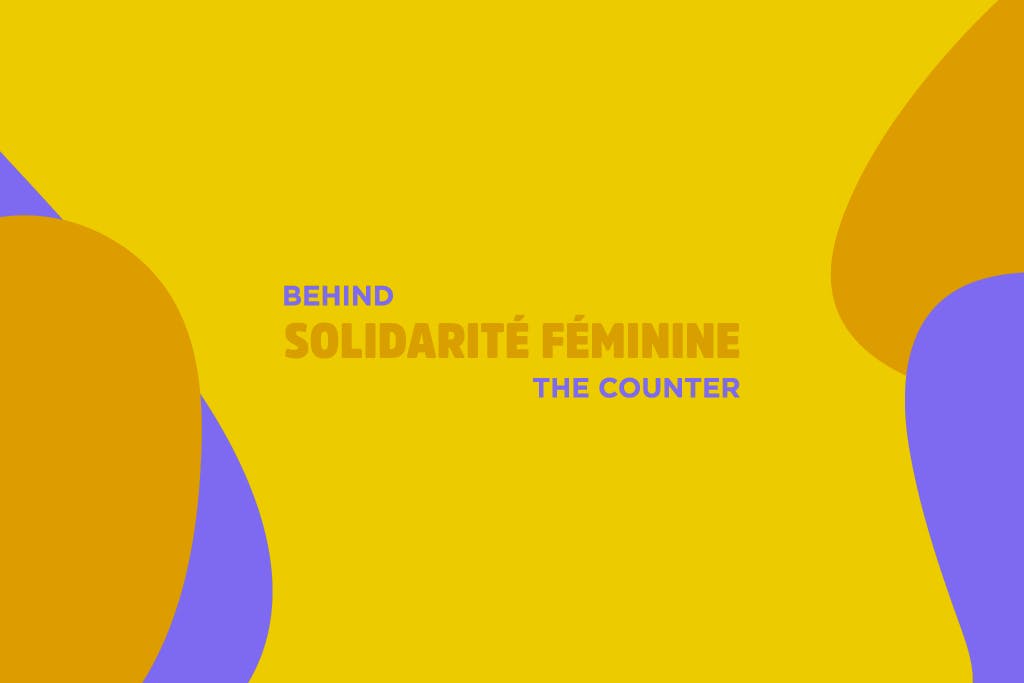
Behind the Counter | Ep.5
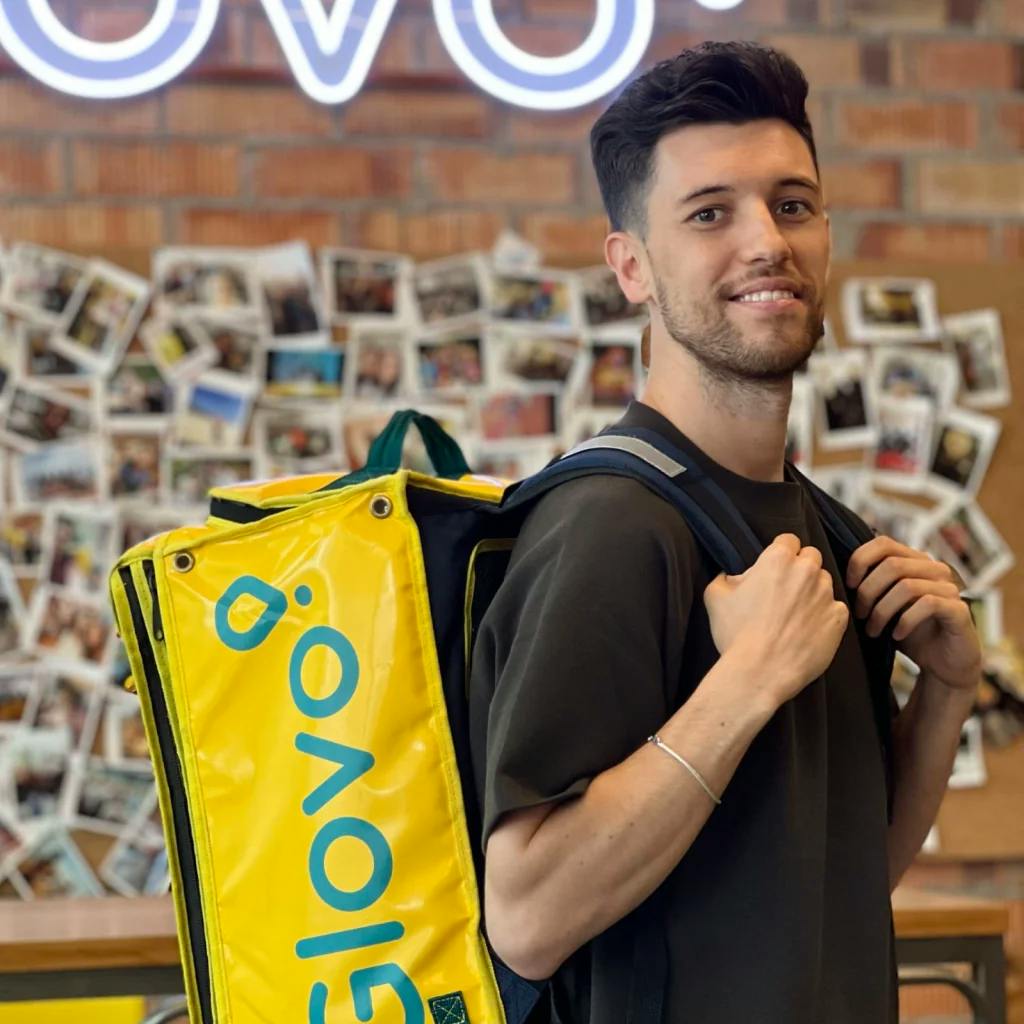
Couscous for the future of single mothers in Morocco. The story of Association Solidarité Féminine (ASF).
Meeting Laila Majdouli is like going on a journey through time, allowing one to witness her life’s events and recognize the hardship she has endured while advocating for the rights of single mothers and their children in Morocco. Her deep brown eyes welcome us to the Palmiers neighbourhood in southern Casablanca, inside a colourful villa from the late 1920s with blue walls and a small entrance framed by purple flowers. The colour of this welcome is no coincidence because, in the month that Glovo dedicates to women, we visited Casablanca to get to know the Association Solidarité Féminine (ASF), or the Association of Female Solidarity.
Founded in 1985, its aim is to protect and give a future to single mothers and their children –in Morocco alone there are more than 30.000 unmarried women who give birth every year, leaving them in a vulnerable position. To support the community of single mothers, this NGO has a restaurant that serves as a tool to teach these mothers a new trade and, when the time comes, to accompany them towards an economically independent life together with their children.
With the aroma of couscous filling the space, we started talking to Laila, Secretary General and co-founder of this Association that, like many others around the world, collaborates with Glovo thanks to the Glovo Access initiative. With this project, Glovo offers its delivery services free of charge to NGOs and social services so that they can focus their resources on what is important: helping those in need.
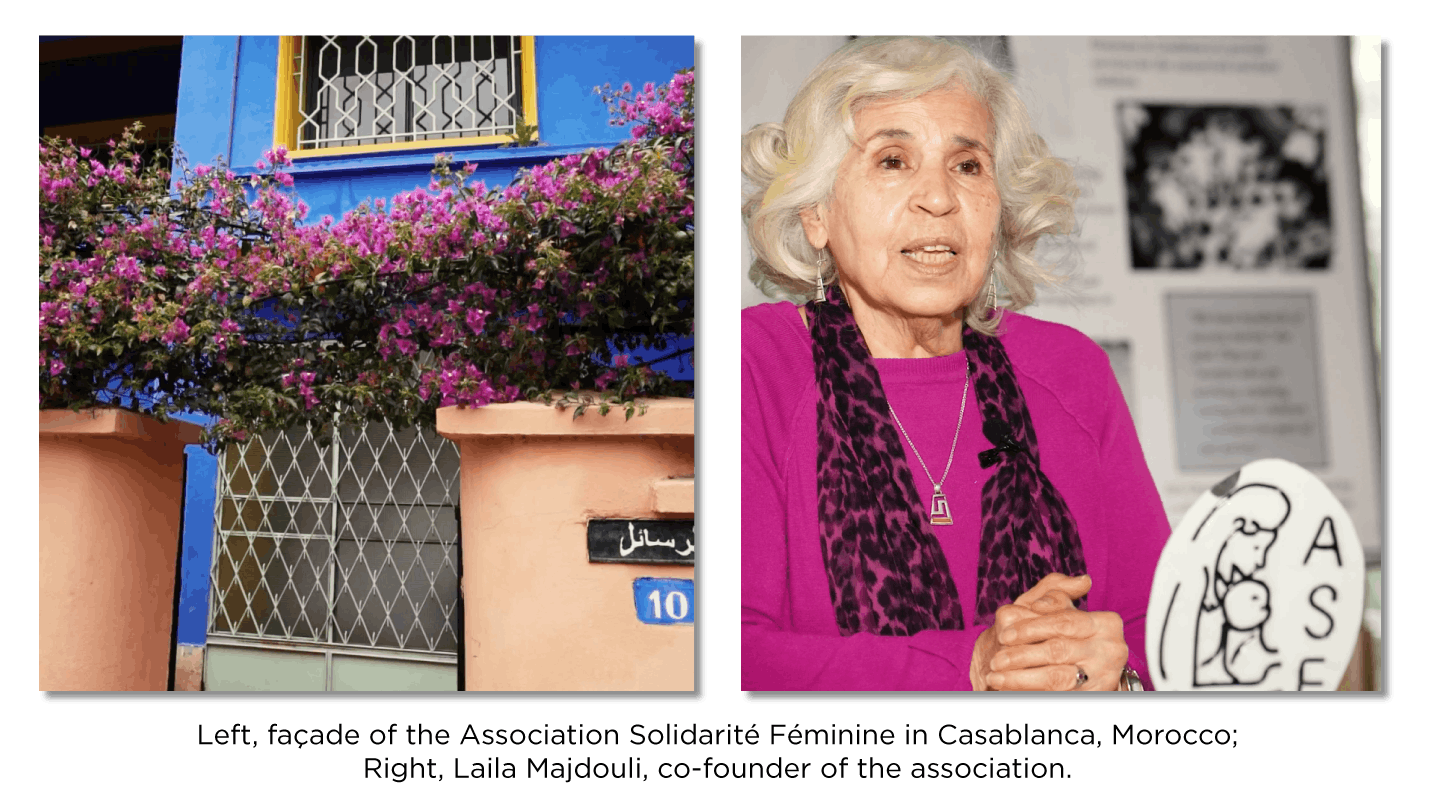
What motivated you to fight for this cause?
“I have been involved in human rights activities in Morocco for a long time and this project came to me through some nuns, who introduced me to the late Aicha Ech Chenna. Aicha was and continues to be one of the leading voices of the feminist cause in Morocco, to the point of being awarded in 1995 with the Human Rights Prize of the French Republic and having the Association officially recognised today as a National Public Utilities Association in the country. I quickly became interested in this topic and joined the project and, in 1985, I took part in the creation of the Association Solidarité Féminine (ASF), aiming to keep fatherless children out of the shadows and give them a chance to have a promising future”. The association has today 20 employees and 10 volunteers on the Administrative Committee.
How does the Association help single mothers?
“The work we do with mothers is part of an intensive rehabilitation programme that lasts 3 years and is focused on providing them with the professional skills needed to be able to live an independent life with their children. To this end, at Solidarité Féminine we teach them various trades through our pastry shop, the hammam –a traditional Arabic bath house– and above all the restaurant. At the latter, we start by teaching them basic hygiene rules and how to prepare simple traditional dishes before moving on to more elaborate recipes. In the meantime, the children are left at daycare centres, allowing their mothers to focus on learning without fearing having them out on the streets”.
A villa from the late 1920s was built for middle-class European families and today is the home for the restaurant where we had the pleasure of speaking to Laila. It was donated by various partners and is located in the Palmiers neighbourhood of Casablanca.
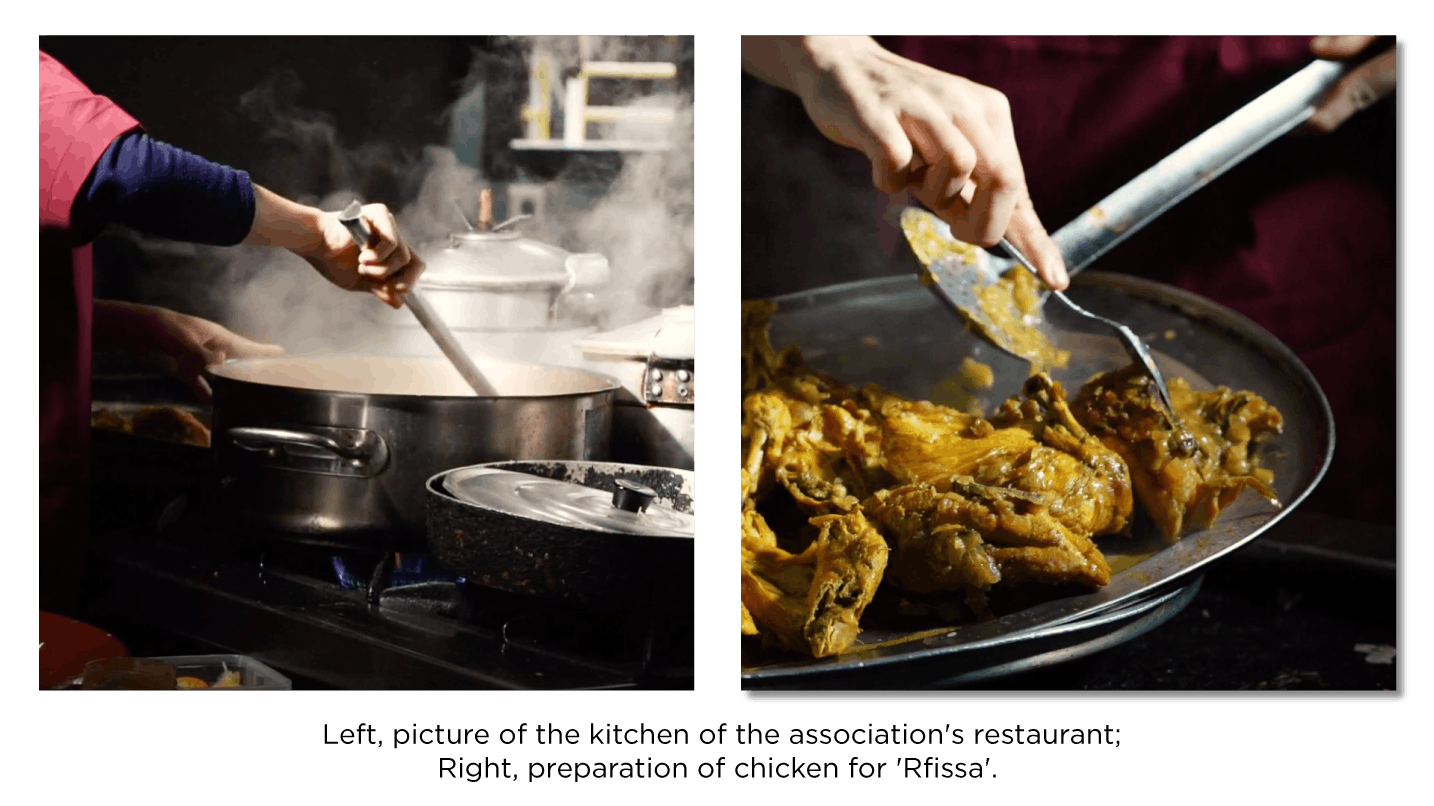
A cuisine of Moroccan tastes
The association’s restaurant serves a wide variety of cuisine with local flavours. In fact, Laila says that many customers who pass by the restaurant’s door come in because of the enticing smell wafting from the kitchen.
The menu ranges from simple, economic dishes to other traditional Moroccan recipes typical for festivities, such as rfissa –stewed chicken, lentils, and onions served on a bed of shredded msemen, trid pastry or bread–, hand-rolled couscous, pastilla –a crispy pie that combines sweet and salty flavours and is often served at weddings and celebrations–, lamb tajine with prunes or chicken with daghmira –a typical sauce made with oil drenched onions.
On the Glovo App, the restaurant of the Solidarité Féminine Association gets most of its orders on Fridays –54% of the total orders during the week–, the holy day for Muslims and where couscous is the typical dish for lunch, hence its peak ordering time is at 12:00h. The most ordered options are couscous viande or poulet, both with vegetables and tfaya (sweet sauce in Moroccan cuisine made with caramelised onions, raisins, cinnamon, and honey).
How is Glovo helping the Association on a daily basis?
“We joined Glovo in December 2020 and it was precisely during the pandemic that it helped us the most. At that time, restaurants were closed and food delivery emerged for us as an opportunity to continue connecting with our customers. In March 2021 alone, the association registered almost 1,000 orders on the app. Glovo, by making its logistics available to an NGO like ours free of charge through the Glovo Access initiative, saved us from falling into crisis and, on the contrary, allows us to earn the necessary monthly profits needed to cover the association’s internal expenses.
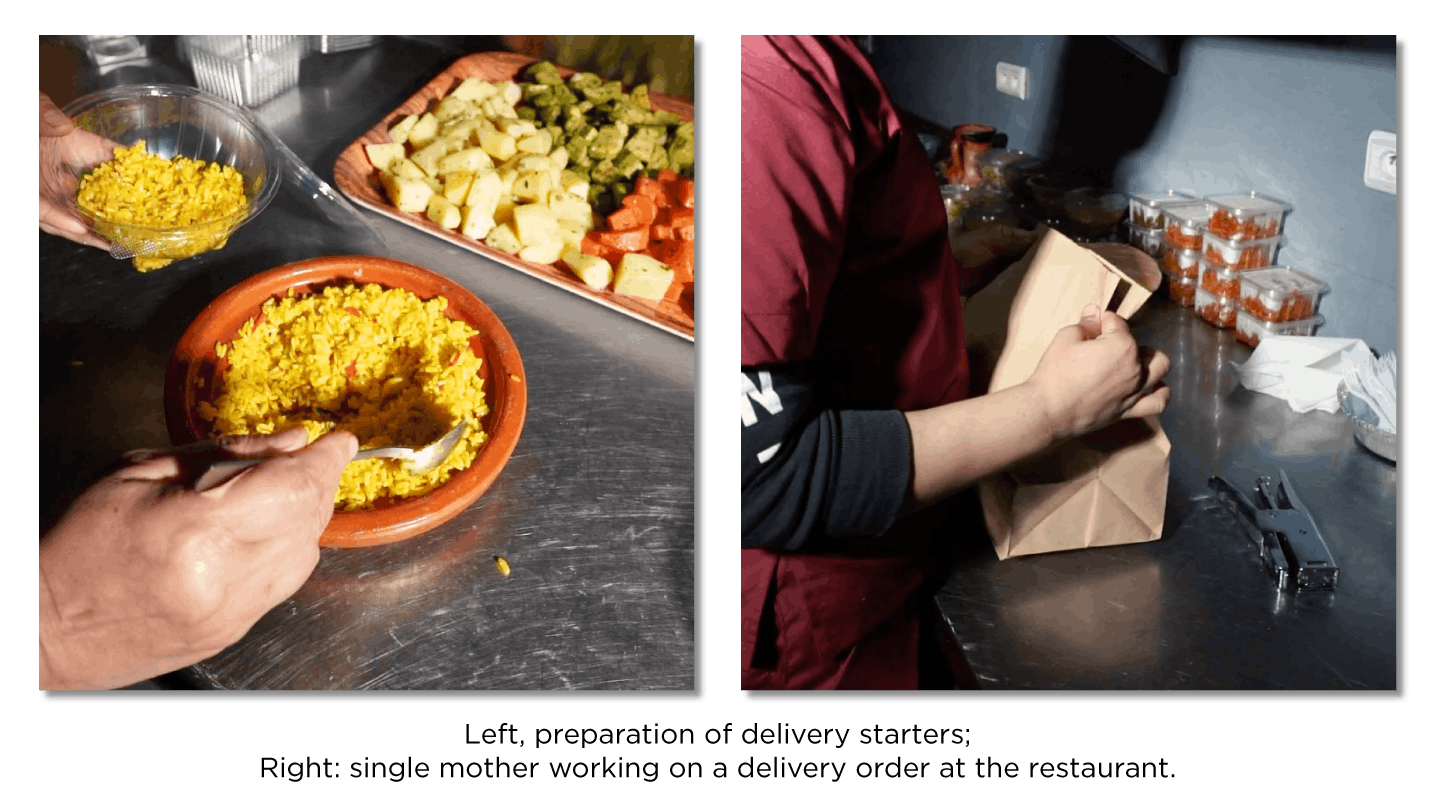
Laila’s story in Casablanca brings us closer to yet other aspects of our work at Glovo, this time through the journey for the recognition of the rights of single mothers and children in Morocco, where the Solidarité Féminine Association has been leading the way for almost 40 years.
In the words of Sébastien Pellion, Head of Impact & Sustainability at Glovo, “The collaboration with Association Solidarité Féminine makes us proud of our impact. It shows that well-used- technology has the power to improve the lives of people, even the most vulnerable individuals. The humanitarian work done by ASF is critical while delivering one of the most delicious foods of Casablanca to our customers. Joining efforts this way gives us the energy to keep on the good fight and continue bringing relentless support to all NGOs who need logistics or marketplace visibility through Glovo Access. For 3 years, more than 2.5 million solidarity meals were delivered through this programme and if you are an NGO and would like to collaborate with us, you can sign-up here!”
Today, Glovo is working on more than 70 projects in 18 countries, bringing help to communities facing situations of extreme vulnerability; often working at a local level to facilitate humanitarian support. The programme has been running for over 3 years now, and so far we have delivered more than 2.3 million meals and rescued >1000 tonnes of food waste globally.
If you'd like to become a Glovo Partner, click here to learn more.